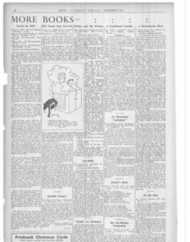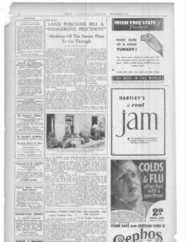Page 20, 6th December 1935
Page 20

Report an error
Noticed an error on this page?If you've noticed an error in this article please click here to report it.
Tags
Share
Related articles
Award For Disney
By
Hayley Unspoiled Star
Graee Conway Remembers These Films
Walt Disney
Wanted: Amateur Walt Disney
Catholic Film Society's Cornpetition
£65 Awarded In Prizes
The Catholic Film Society is in search of an amateur. Walt Disney and five to twelve artists who will give their time and talents to making short cartoons for educational purposes.
Speaking at a meeting of the society which took place on Tuesday at the Millicent Fawcett Hall, Westminster, to award prizes to the winners of the 1935 International Competition (see Catholic Herald, November 22, for names ot winners), Fr. Ferdinand Valentine, 0.P., the chairman of the society, said that Walt Disney was the finest creator of films in our day. The cartoon was real creation in 'cinematography.
Mr. Disney made on an average twelve Mickey Moe and twelve Silly Symphonies each year. He employed two or three hundred artists who, between them, drew six or seven thousand drawings for each film—a terrific labour.
A Cartoon Unit
The question he wanted to put before the society was how could such films be created in England, and was it possible to make short cartoons for educational purposes. He held the view that the Catholic Film Society, which at present had three units, Production, Projection and Miming, should now have a fourth, a Cartoon unit.
If five or twelve artists would come forward and offer their services it would he possible to produce such films at a small cost and which would be valuable for use in schools.
Fr. Valentine concluded his lecture by introducing Mr. Vernor Miles, the
managing-director of the Catholic Herald, who was about to present the prizes awarded by that paper in the 1935 international competition. In proposing a vote of thanks on behalf of the society, Fr. Valentine said that Mr. Miles had been the only one to come forward with charity, generosity and vision at a time when the society was in urgent need of such help.
Mr. Miles's Speech Awarding the prizes, Mr. Miles explained why the " Herald " was represented there and why it was giving the prizes. He explained that the paper had been taken over by new proprietors eighteen months ago, that it was placed under entirely new management.
Its policy was a new one and its intention was to produce a secular paper taking its place among the other secular papers of the country, but edited and managed entirely by Catholics.
It had a religious motive in that its object was to help bind together men and women of the Christian faith, though it was not a religious newspaper in the usually accepted sense. Therefore it was seeking a new field.
But at the start it was difficult to put into practice, and it was necessary to find subjects on which intelligent people thought alike. One of the subjects which sprang to mind very early was the necessity for change and improvement in ;he
Clftema.
Improvement Through Amateurs It was felt that it was not merely the function of the " Herald " to emphasise the need for change or even to support the pressure against undesirable films, but to suggest a way of improving them, and it was decided that the very best way was to encourage the amateur production of films.
He thought Fr. Valentine would agree that the "Herald's" efforts had helped to (Continued from previous column.) had been doing work on its own in the same direction by .using the travelling services of Western Electric to give cinematograph shows in schools and parish halls. Nearly 400 shows had been given up to the present time, and this work was .paving the wayfor the work of the Film Society later on.
Goodwill in the Trade
Mr. Miles said that from his personal experience of the cinema trade he knew that there was a tremendous amount of good will there waiting to be tapped. There was, of course, the usual resictance to anything new. But everything he had seen suggested that the trade was only too willing and ready to be het ped
blog comments powered by Disqus





















